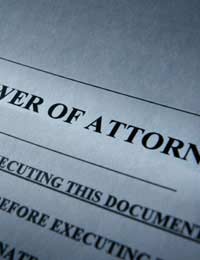When Should I Use the Power of Attorney?

Power of attorney, more correctly known as lasting power of attorney or LPA, is an important legal facility allowing individuals to appoint others to take charge of financial affairs and other crucial aspects of their day-to-day lives. It should only be used in very specific circumstances, and it is vital that the nominated individual is chosen carefully.
What is LPA?
Broadly speaking, LPA refers to a legal document appointing someone to take charge of the affairs of another individual. The appointed person is known as the ‘attorney’. Power of attorney can be granted at any time when the individual whose affairs will be taken charge of is mentally capable. This is known as ‘having capacity’. It must then be registered with the Office of the Public Guardian; failure to do so will render the document unenforceable.However, it is important to remember that an LPA document, once registered, can be used at any time – regardless of whether or not you are mentally capable. You should therefore think carefully about timing in order to avoid the possibility of having someone take charge of your affairs when you are still capable of making decisions yourself.
There are two types of LPA. A Property and Affairs LPA grants an attorney the power to make financial decisions for you, while a Personal Welfare LPA grants the power to make healthcare and general wellbeing decisions on your behalf.
When should I register Lasting Power of Attorney?
You should give serious consideration to timing when it comes to drawing up LPA. To begin with, it is important that you draw up the document and nominate an attorney in good time; if you know that you have an illness that will ultimately render you unable to make your own decisions you should probably think about registering an LPA sooner rather than later.However, you should make sure that your nominated attorney will be able to judge when you are no longer capable of making your own decisions; you will presumably wish to avoid the possibility of the attorney taking charge of your affairs before it is absolutely necessary for them to do so. It is therefore generally best to nominate a close family member or friend, although professional attorneys do exist.
It is also possible to cancel an LPA. This can be done at any time, as long as the individual whose affairs are to be managed still has capacity. Furthermore, a Property and Affairs LPA will automatically be cancelled if the nominated attorney becomes bankrupt.
Drawing up and registering an LPA is a significant life decision, and one that should only be taken after serious consideration. You should think about seeking professional advice before entering into this sort of arrangement. The Office of the Public Guardian can offer general advice regarding LPA, but you should also think about taking personalised advice from a solicitor.
Finally, make sure that you are not rushed into granting LPA. No-one can force you to enter into such an arrangement, and you should only do so in your own time.
- Negotiating Inheritance: Dealing With the Emotional Impact
- Investing Your Inheritance in an Economic Downturn
- Religious Practices and Their Impact on Inheritance Law
- Dealing with Tax Payments
- Acting as Personal Representative
- Money Owed to and by the Deceased
- Who Will Pay Inheritance Tax?
- People Who Are Exempt from Paying Inheritance Tax
- Consulting a Solicitor About Inheritance Issues
- Addressing Inheritance Issues Prior to Death of Your Loved One
- Where to Get Bereavement Support
- Gifting Money or Assets for Inheritance Tax Exemption
- Seeking Legal Advice When Planning Inheritance


Re: Will Inheritance Affect My Council Tenancy?
Im facing similar situation. Inheritence only enough to buy foreign property, agricultural holding, or derelict…
Re: Inheriting Property
Am I allow to get housing benefit on my mums property till its sold?even though I will eventually be entitled to 25%of the sale
Re: Inheriting Property
Am I allow to get housing benefit on my mums property till its sold?even though I will eventually be entitled to 25%of the sae
Re: Will Inheritance Affect My Council Tenancy?
I am living in temporary council accommodation and due to illness am receiving PIP plus Universal Credit. I am…
Re: Will Inheritance Affect My Council Tenancy?
I’m a council tenant my died and left a flat over 55 to live in that buliding to me how’s do I go ambition…
Re: Will Inheritance Affect My Council Tenancy?
I doubt this will be answered as I can’t see any answers to anyone else’s comments but here goes My mum wants…
Re: Will Inheritance Affect My Council Tenancy?
I have inherited property from my mother in law, as we live in council property could we rent the inherited…
Re: Will Inheritance Affect My Council Tenancy?
Assured social housing tenant (SH), lone parent recently deceased leaving an estate including a 3 bedroom…
Re: Will Inheritance Affect My Council Tenancy?
My disabled son lives in a council flat and receives benefits, including PIP. How could I arrange for him to…
Re: Will Inheritance Affect My Council Tenancy?
me and my brother are set to inherit 2 propertys but we have council flats. will we loose our rights to council…